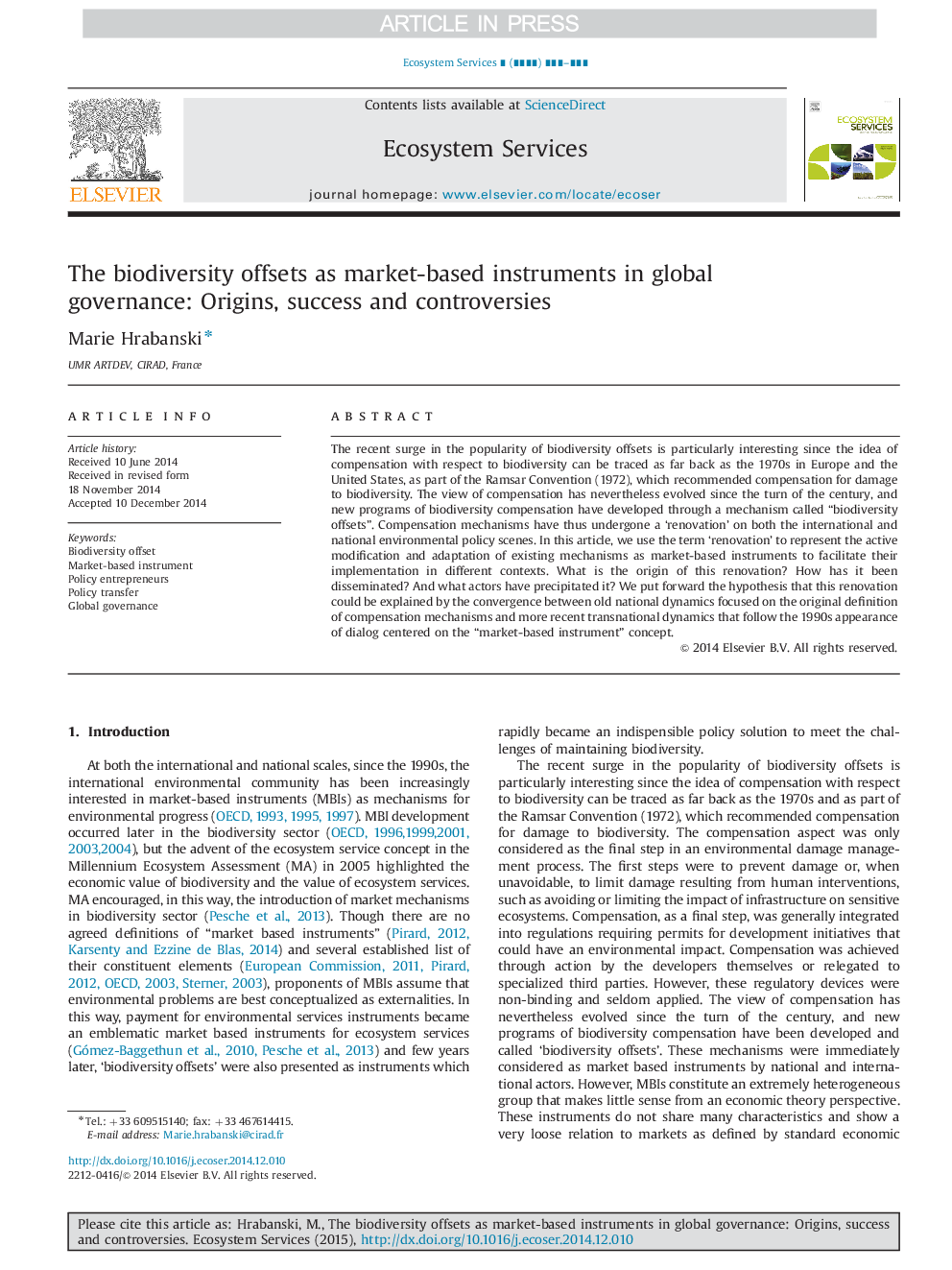| کد مقاله | کد نشریه | سال انتشار | مقاله انگلیسی | نسخه تمام متن |
|---|---|---|---|---|
| 6556710 | 161847 | 2015 | 9 صفحه PDF | دانلود رایگان |
عنوان انگلیسی مقاله ISI
The biodiversity offsets as market-based instruments in global governance: Origins, success and controversies
ترجمه فارسی عنوان
تعرفه های تنوع زیستی به عنوان ابزار مبتنی بر بازار در حکومت جهانی: ریشه، موفقیت و اختلافات
دانلود مقاله + سفارش ترجمه
دانلود مقاله ISI انگلیسی
رایگان برای ایرانیان
کلمات کلیدی
تنوع زیستی، ابزار مبتنی بر بازار، سیاست کارآفرینان، انتقال سیاست، حکومت جهانی،
ترجمه چکیده
افزایش اخیر محبوبیت تنزل تنوع زیستی بسیار جالب است، زیرا ایده جبران خساره با توجه به تنوع زیستی می تواند در دهه 1970 در اروپا و ایالات متحده به عنوان بخشی از کنوانسیون رامسر (1972) که توصیه می شود جبران خسارت برای آسیب زدن به تنوع زیستی. با این وجود، دیدگاه جبران خسارت از قرن بیستم تکامل یافته است و برنامه های جدید جبران هزینه های تنوع زیستی با استفاده از یک مکانیسم به نام تنزل تنوع زیستی توسعه یافته است. بدین ترتیب، مکانیزم های جبران خسارت در معرض بازسازی هر دو صحنه سیاست های بین المللی و ملی قرار می گیرند. در این مقاله، ما اصطلاح "نوسازی" را برای نشان دادن اصلاح فعال و سازگاری مکانیسم های موجود به عنوان ابزار مبتنی بر بازار برای تسهیل اجرای آن در زمینه های مختلف استفاده می کنیم. منشا این نوسازی چیست؟ چگونه منتشر شد؟ و چه بازیگران آن را تحریک کرده اند؟ ما پیشنهادی را مطرح کردیم که این نوسازی را می توان با همگرایی بین پویایی ملی قدیمی متمرکز بر تعریف اولیه مکانیسم های جبران خسارت و دینامیک های فراملی اخیر مطرح کرد که به دنبال شکل گیری گفتمان متمرکز بر یک ابزار مبتنی بر بازار است. مفهوم
موضوعات مرتبط
علوم زیستی و بیوفناوری
علوم کشاورزی و بیولوژیک
علوم کشاورزی و بیولوژیک (عمومی)
چکیده انگلیسی
The recent surge in the popularity of biodiversity offsets is particularly interesting since the idea of compensation with respect to biodiversity can be traced as far back as the 1970s in Europe and the United States, as part of the Ramsar Convention (1972), which recommended compensation for damage to biodiversity. The view of compensation has nevertheless evolved since the turn of the century, and new programs of biodiversity compensation have developed through a mechanism called “biodiversity offsets”. Compensation mechanisms have thus undergone a 'renovation' on both the international and national environmental policy scenes. In this article, we use the term 'renovation' to represent the active modification and adaptation of existing mechanisms as market-based instruments to facilitate their implementation in different contexts. What is the origin of this renovation? How has it been disseminated? And what actors have precipitated it? We put forward the hypothesis that this renovation could be explained by the convergence between old national dynamics focused on the original definition of compensation mechanisms and more recent transnational dynamics that follow the 1990s appearance of dialog centered on the “market-based instrument” concept.
ناشر
Database: Elsevier - ScienceDirect (ساینس دایرکت)
Journal: Ecosystem Services - Volume 15, October 2015, Pages 143-151
Journal: Ecosystem Services - Volume 15, October 2015, Pages 143-151
نویسندگان
Marie Hrabanski,
